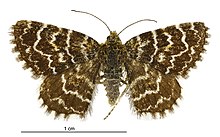Notoreas ischnocyma
| Notoreas ischnocyma | |
|---|---|

| |
| Female | |
| Scientific classification | |
| Domain: | Eukaryota |
| Kingdom: | Animalia |
| Phylum: | Arthropoda |
| Class: | Insecta |
| Order: | Lepidoptera |
| Family: | Geometridae |
| Genus: | Notoreas |
| Species: | N. ischnocyma
|
| Binomial name | |
| Notoreas ischnocyma | |
Notoreas ischnocyma is a species of moth in the family Geometridae. This species is endemic to New Zealand. This species is found in Canterbury and Otago.
Taxonomy

Notoreas ischnocyma was described by Edward Meyrick in 1905 using material collected at Castle Hill by George Hudson at an elevation of 1700 meters.[1][2] Hudson had previously illustrated the specimen in his 1898 book New Zealand Moths and Butterflies (Macro-lepidoptera) but had included it within the species N. isoleuca.[3][4] Hudson subsequently agreed with Meyrick and discussed and illustrated this species under the new species name in The Butterflies and Moths of New Zealand.[5]
The genus Notoreas was reviewed in 1986 by R. C. Craw and the placement of this species within it was confirmed.[6] However species within the genus Notoreas are currently regarded as being in need of revision.[7] The holotype specimen is held at the Natural History Museum, London.[3]
Description
Meyrick described the species as follows:
♂︎. 20 mm. Head and thorax dark fuscous. Fore-wings triangular, costa slightly arched, termen obliquely rounded; dark fuscous, with some scattered yellow-whitish scales; subbasal, first, median,second, and subterminal lines slender, whitish, subbasal straight, first nearly straight, somewhat irregular, median indistinct, curved outwards in disc, second waved throughout, angulated in middle, indented beneath middle, subterminal irregularly waved: cilia white, basal half barred with dark fuscous. Hind-wings with ground colour, median, second, and subterminal lines, and cilia as in fore-wings.[2]
N. ischnocyma can be distinguished from similar species by the slender second wavy line on its forewings.[2][5]
Distribution

This species is endemic to New Zealand.[8][9] Other than the type locality of Castle Hill, N. ischnocyma has also been found in the Hawkdun and the Dansey ecological districts in Otago.[10][11]
Biology and behaviour
This day flying species is on the wing in December and January.[5][11]
Habitat and host species
This species inhabits high alpine stunted vegetation and herb fields.[5][11] Larvae of species within the genus Notoreas feed exclusively on plants within the genera Pimelea and Kelleria.[12]
References
- ^ a b "Notoreas ischnocyma Meyrick, 1905". www.nzor.org.nz. Manaaki Whenua - Landcare Research. Retrieved 2018-12-09.
- ^ a b c Meyrick, Edward (1905). "Notes on New Zealand Lepidoptera". Transactions of the Entomological Society of London. 1905: 219–244 – via Biodiversity Heritage Library.
- ^ a b Dugdale, John S. (1988-09-23). Lepidoptera - annotated catalogue, and keys to family-group taxa (PDF). Vol. 14. pp. 1–264. ISBN 978-0-477-02518-8 – via Manaaki Whenua - Landcare Research.
{{cite book}}:|journal=ignored (help) - ^ Hudson, G. V. (1898). New Zealand Moths and Butterflies (Macro-lepidoptera). London: West, Newman & co. pp. plate viii fig. 27. doi:10.5962/bhl.title.32466. OCLC 727236768.
- ^ a b c d Hudson, G. V. (1928). The Butterflies and Moths of New Zealand. Wellington: Ferguson & Osborn Ltd. p. 126. OCLC 25449322.
- ^ Craw, R.C. (5 January 2012). "Review of the genus Notoreas (sensu auctorum) (Lepidoptera: Geometridae: Larentiinae)". New Zealand Journal of Zoology. 13 (1): 131–140. doi:10.1080/03014223.1986.10422654.
- ^ Hoare, R. J. B; Rhode, B.E.; Emmerson, A.W. (2011). "Larger moths of New Zealand: Image gallery and online guide". Manaaki Whenua Landcare Research. Retrieved 9 December 2018.
- ^ Gordon, Dennis P., ed. (2010). New Zealand Inventory of Biodiversity. Volume Two. Kingdom Animalia: Chaetognatha, Ecdysozoa, Ichnofossils. Vol. Vol. 2. Christchurch, N.Z.: Canterbury University Press. p. 460. ISBN 9781877257933. OCLC 973607714.
{{cite book}}:|volume=has extra text (help) - ^ "Notoreas ischnocyma Meyrick, 1905". www.nzor.org.nz. Manaaki Whenua - Landcare Research. Retrieved 2018-12-09.
- ^ Patrick, Brian H. (1994). Hawkdun Ecological District invertebrate survey. 0113-3713. Vol. 64. Wellington, N.Z.: Department of Conservation. CiteSeerX 10.1.1.227.2484. ISBN 978-0478015539. ISSN 0113-3713. OCLC 53885579.
- ^ a b c Patrick, Brian H. (1991). Insects of the Dansey ecological district (PDF). Wellington [N.Z.]: Department of Conservation. pp. 7, 18. ISBN 978-0478012859. ISSN 0113-3713. OCLC 154612987.
- ^ Patrick, BH; Hoare, RJB; Rhode, BE (December 2010). "Taxonomy and conservation of allopatric moth populations: a revisionary study of the Notoreas perornata Walker complex (Lepidoptera: Geometridae: Larentiinae), with special reference to southern New Zealand". New Zealand Journal of Zoology. 37 (4): 257–283. doi:10.1080/03014223.2010.511127.
